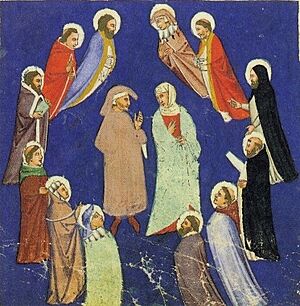Siger of Brabant facts for kids
Siger of Brabant (born around 1240 – died before November 10, 1284) was an important philosopher in the 1200s. He came from the southern Low Countries (which are now parts of Belgium and the Netherlands). Siger was a strong supporter of a way of thinking called Averroism.
Contents
Siger's Life
Early Years
We do not know many details about Siger's early life. In 1266, he was a part of the Faculty of Arts at the University of Paris. During this time, a fight broke out between groups of students. These groups were called "nations." Siger was accused of being a leader in one of these student fights. He was threatened with punishment, but nothing more happened.
His Writings
In the ten years after the student fight, Siger wrote six important books. These books were later published together. Here are some of their titles:
- De anima intellectiva (about the thinking soul)
- De aeternitate mundi (about the world being eternal)
- Impossibilia (about impossible things)
University Leader
In 1271, Siger was involved in another struggle at the university. A smaller group of students chose him as their leader, or "rector." This was against the person who had been officially elected. This disagreement lasted for three years. It was likely due to different ideas between Siger's group, the Averroists, and other more traditional thinkers.
A church official, Simon de Brion, helped settle the matter. Siger then left Paris and went to Liège.
Time in Liège
Siger was accused of teaching something called "double truth." This idea suggested that something could be true based on human reason, but the opposite could also be true based on religious faith. However, Siger was a scholastic thinker. This means he likely tried to find ways for faith and reason to agree, rather than teaching two opposite truths.
In 1277, many ideas based on Aristotelianism were officially condemned by the church. A special part of this condemnation was aimed at Siger and another philosopher. Siger was called to answer charges of heresy, especially because of his book Impossibilia. This book discussed the existence of God. It seems that Siger and his friend fled to Italy.
Siger's Death
The way Siger died is not fully known. He died in a city called Orvieto. One old story says that his own secretary, who seemed to be unwell, stabbed him. Some people even claimed the secretary used a pen to kill him.
Another old poem from the 1200s suggests he was executed in Orvieto. This might have happened around 1283 or 1284. At that time, the Pope was living in Orvieto. There was no big investigation into his death.
Siger believed that good laws were more important than good leaders. He also disagreed with the idea that the Pope could never be wrong in worldly matters. Siger's ideas were important because he fully accepted Averroism. This led to strong disagreement from other famous thinkers like Albertus Magnus and Aquinas.
In 1270, the church officially condemned Averroism. Because of his beliefs, Siger faced challenges from both the Church and other philosophers throughout his life.
See also
 In Spanish: Siger de Brabant para niños
In Spanish: Siger de Brabant para niños
Images for kids
 | Janet Taylor Pickett |
 | Synthia Saint James |
 | Howardena Pindell |
 | Faith Ringgold |



